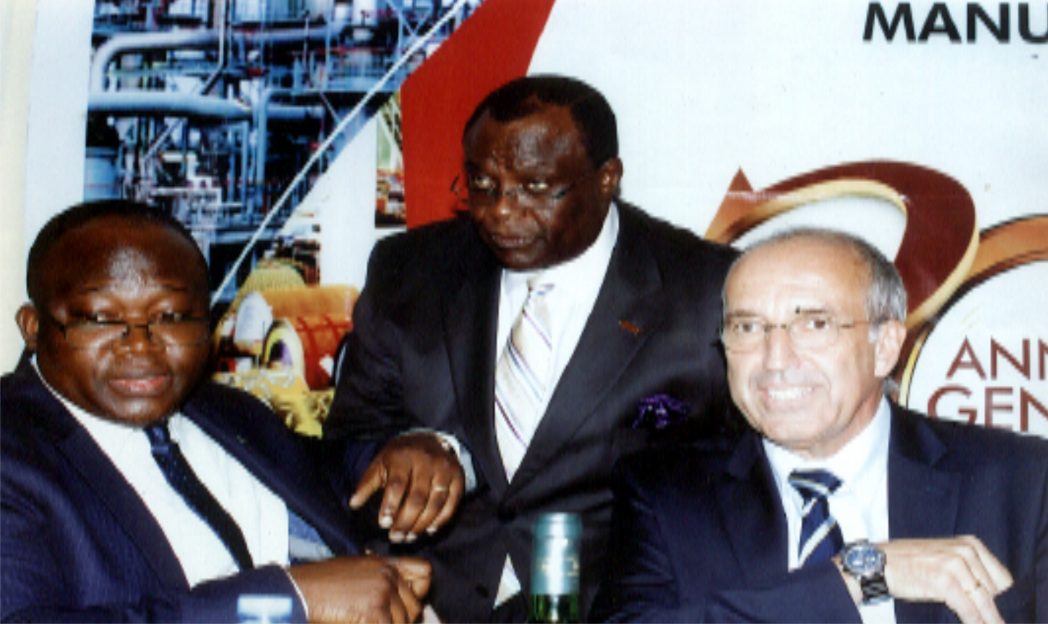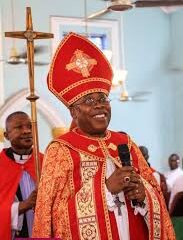News
Court Orders Service On Jonathan …In Fresh Disqualification Suit
A Federal High Court in Abuja has ordered that President Goodluck Jonathan be served with court documents in a suit seeking to disqualify him from seeking re-election in the forthcoming poll.
There are two pending suits seeking Jonathan’s disqualification from participating in the presidential election now re-scheduled to hold on March 28, before Justice Ahmed Mohammed of the Federal High Court, Abuja.
There is another suit seeking to disqualify the President from the forthcoming election pending before the Court of Appeal in Abuja.
Justice Mohammed, to whom the fresh suit was assigned, on Friday, granted an ex-parte order directing the service of the court papers on Jonathan.
The judge ordered that the court papers be served on the President either through the office of the Secretary to the Government of the Federation or the Attorney General of the Federation.
The judge made order for substituted service on the President Jonathan following the complaint of the plaintiff, Nkemjika Nkemjika, in his ex parte application that it was impossible to effect personal service on the President, who resides in “the well-fortified Aso Rock Villa, Abuja.”
The President, the Independent National Electoral Commission (INEC) and the Peoples Democratic Party (PDP) are the defendants in the suit.
Nkemjika asks the court in his suit marked, FHC/ABJ/CS/1112/2015, to determine whether, having regard to the provisions of sections 135(1)(b) and 135(2)(b) of the Constitution, Jonathan was qualified to contest this year’s presidential election.
The plaintiff argued that Jonathan’s second term in office will end on May 29, 2015, because Section 135(2) (b) of the Constitution that determines the tenure of the office of the country’s President, did not make any provision for a Vice-President to complete the unexpired tenure of office or unexpired term of office of a deceased President.
He contended that the President would have been eligible to further contest this year’s presidential election, if he had won an election overseen by the Senate President in 2010 in accordance with the provision of Section 146 (2) of the Constitution.
According to sub-section 1 of Section 146 (2), “during a period when the office of the Vice-President is also vacant, the President of the Senate shall hold the office of the President for a period of not more than three months, during which there shall be an election of a new President, who shall hold office for the unexpired term of office of the last holder of the office.”
The plaintiff urged the court to nullify the nomination of Jonathan as PDP’s candidate for the forthcoming presidential election in view of the provision of Section 135(1) (b) of the Constitution to the effect that “a person shall hold the office of President until he dies whilst holding such office.”
He equally wants the court to declare that the two terms limit, allowed President Jonathan as a democratically elected president under the Constitution, shall elapse on May 29 this year.
He further prayed the court to declare that Jonathan is not qualified to stand for election in view of the provisions of sections 135(1) (b) and 135(2) (b) of the Constitution.
Justice Mohammed has adjourned further hearing in the case to February 26.

L-R: Senior Special Assistant to Bayelsa State Governor on SME Development, Hon. Ebiekure Eradiri, representing Bayelsa State Governor, Chairman, MAN, Rivers/Bayelsa States, Hon. Charles Beke, Total Manager, Enterprise Development, Philippe Desriac, during 30th Annual General Meeting of MAN, Rivers/Bayelsa States in Port Harcourt. Photo: Egberi A. Sampson
News
Tinubu Lauds Dangote’s Diesel Price Cut, Foresees Economic Relief

President Bola Tinubu, yesterday, applauded Dangote Oil and Gas Limited for reducing the price of Automotive Gas Oil, also known as diesel, from N1,650 to N1,000 per litre.
The Dangote Group recently reviewed downwards the gantry price of AGO from N1,650 to N1,000 per litre for a minimum of one million litres of the product, as well as providing a discount of N30 per litre for an offtake of five million litres and above
Tinubu described the move as an “enterprising feat” and said, “The price review represents a 60 per cent drop, which will, in no small measure, impact the prices of sundry goods and services.”
In a statement signed by his Special Adviser on Media and Publicity, Ajuri Ngelale, Tinubu affirmed that Nigerians and domestic businesses are the nation’s surest transport and security to economic prosperity.
The statement is titled ‘President Tinubu commends Dangote Group over new gantry price of diesel.’
Tinubu also noted the Federal Government’s 20 per cent stake in Dangote Refinery, saying such partnerships between public and private entities are essential to advancing the country’s overall well-being.
Therefore, he called on Nigerians and businesses to, at this time, put the nation in priority gear while assuring them of a conducive, safe, and secure environment to thrive.
This statement comes precisely a week after Dangote met President Tinubu in Lagos, where he said Nigerians should expect a drop in inflation given the cut in diesel pump prices.
“In our refinery, we have started selling diesel at about ¦ 1,200 for ¦ 1,650 and I’m sure as we go along…this can help to bring inflation down immediately,” Dangote told journalists after he paid homage to President Bola Tinubu at the latter’s residence to mark Eid-el-Fitr.
The businessman said his petroleum refinery had been selling diesel at N1,200 per litre, compared to the previous price of N1,650–N1,700.
He expressed hopes that Nigeria’s economy will improve, as the naira has made some gains in the foreign exchange market, dropping from N1,900/$ to the current level of N1,250 – N1,300.
Dangote said this rise in value has sparked a gradual drop in the price of locally-produced goods, such as flour, as businesses are paying less for diesel. Therefore, he asserted that the reduced fuel costs would drive down inflation in the coming months.
“I believe that we are on the right track. I believe Nigerians have been patient and I also believe that a lot of goodies will now come through.
“There’s quite a lot of improvement because, if you look at it, one of the major issues that we’ve had was the naira devaluation that has gone very aggressively up to about ¦ 1,900.
“But right now, we’re back to almost ¦ 1,250, ¦ 1,300, which is a good reprieve. Quite a lot of commodities went up.
“When you go to the market, for example, something that we produce locally, like flour, people will charge you more. Why? Because they’re paying very high prices on diesel,” he explained.
He argued that the reduced diesel price would have “a lot of impact” on local businesses.
“Going forward, even though the crude prices are going up, I believe people will not get it much higher than what it is today, N1,200.
“It might be even a little bit lower, but that can help quite a lot because if you are transporting locally-produced goods and you were paying N1,650, now you are spending two-thirds of that amount, N1,200. It’s a lot of difference. People don’t know.
“This can help bring inflation down immediately. And I’m sure when the inflation figures are out for the next month, you’ll see that there’s quite a lot of improvement in the inflation rate, one step at a time. And I’m sure the government is working around the clock to ensure things get much better,” Dangote added.
He also urged captains of industry to partner with the government to improve the lives of citizens.
“You can’t clap with one hand,” said the businessman, adding, “So, both the entrepreneurs and the government need to clap together and make sure that it is in the best interest of everybody.”
News
Court Halts Amaewhule-Led Assembly From Extending LG Officials’ Tenure

The Rivers State High Court sitting in Port Harcourt has issued an interim injunction directing the maintenance of status quo ante belum following the move by the Martin Amaewhule-led Assembly in Rivers State to extend the tenure of the elected local government councils’ officials.
The Amaewhule-led Assembly, which is loyal to the Minister of Federal Capital Territory, Nyesom Wike, had amended the Local Government Law Number 5 of 2018 and other related matters.
Amaewhule, explained that the amendments of Section 9(2), (3) and (4)of the Principal Law was to empower the House of Assembly via a resolution to extend the tenure of elected chairmen and councilors, where it is considered impracticable to hold local government elections before the expiration of their three years in office.
But the court asked all the parties to maintain the status quo ante belum pending the hearing and determination of motion on notice for the interlocutory injunction.
The court presided over by G.N. Okonkwo also ordered that the claimant/applicant would enter into an undertaking to indemnify the defendants in the sum of N5million should the substantive case turned out to be frivolous.
The court fixed April 22, 2024 to hear the motion on notice for interlocutory injunction.
Okonkwo also issued an order of substituted service of the motion on notice for interlocutory injunction, originating summons and other subsequent processes on the defendants.
The orders were made following a suit filed by Executive Chairman, Opobo-Nkoro, Enyiada Cooky-Gam; Bonny, Anengi Claude-Wilcox; and five other elected council officials challenging the decision of the Amaewhule-led House of Assembly to extend the tenure of local government areas.
Also named as defendants in the suit are the Governor of Rivers State, the Government of Rivers State and the Attorney-General of Rivers State.
The claimants/applicants are praying the court for a declaration that under section 9(1) of the Rivers State Local Government Amendment Law number 5 of 2018 the tenure of office of the chairmen and members of the 23 local government councils of Rivers State is three years
A declaration that the tenure of office of the elected chairmen and members of the local government areas would expire on the 17th of June 2024 having commenced on the 18th of June 2021 when they were sworn in.
A declaration that the defendants cannot in any manner or form extend the tenure of office of the chairmen and members of the local government areas after the expiration of their tenure.
An order of perpetual injunction restraining the defendants from extending the tenure of office of the chairmen and members of the local government areas.
An order of perpetual injunction restraining the 28th, 29th and 30th defendants (the Governor, the Government House and the Attorney-General) from giving effects to any purported extension of the tenure of the chairmen and members of the local government areas.
They also prayed for an order of interlocutory injunction directing all the defendants to maintain the status quo by not elongating the three-year tenure of the chairmen and councilors.
The claimants further sought an order of interlocutory injunction restraining the defendants from extending the tenures of the chairmen and the councilors.
News
Nigeria’s Inflation Rate’ll Drop To 23% By 2025 -IMF

In a recent release of its Global Economic Outlook at the International Monetary Fund/World Bank Spring Meetings in Washington D.C., on Tuesday, the IMF provided projections for Nigeria’s economy, indicating a significant shift in inflation rates.
Division Chief of the IMF Research Department, Daniel Leigh, highlighted the impact of Nigeria’s economic reforms, including exchange rate adjustments, which have led to a surge in inflation rate to 33.2 percent in March.
Nigeria’s inflation rate rose to 33.2 percent according to recent data released by the National Bureau of Statistics.
Also, the food inflation rate increased to over 40 per cent in the first quarter of 2024.
Leigh stated, “We see inflation declining to 23 per cent next year and then 18 percent in 2026.”
This is however different from the fund’s prediction of a new single-digit (15.5 per cent ) inflation rate for 2025 which it predicted last year.
He further elaborated on Nigeria’s economic growth, which is expected to rise from 2.9 percent last year to 3.3 percent this year, attributing this expansion to the recovery in the oil sector, improved security, and advancements in agriculture due to better weather conditions and the introduction of dry season farming.
The IMF official also noted a broad-based increase in Nigeria’s financial and IT sectors.
“Inflation has increased, reflecting the reforms, the exchange rate, and its pass-through into other goods from imports to other goods,” Leigh explained.
He added that the IMF revised its inflation projection for the current year to 26 percent but emphasised that tight monetary policies and significant interest rate increases during February and March are expected to curb inflation.
An official of the IMF Research Department, Pierre Olivier Gourinchas commented on the global economic landscape, mentioning that oil prices have risen partly due to geopolitical tensions, and services inflation remains high in many countries.
Despite Nigeria’s inflation target of six to nine percent being missed for over a decade, Gourinchas stressed that bringing inflation back to target should be the priority.
He warned of the risks posed by geo-economic fragmentation to global growth prospects and the need for careful calibration of monetary policy.
“Trade linkages are changing, and while some economies could benefit from the reconfiguration of global supply chains, the overall impact may be a loss of efficiency, reducing global economic resilience,” Gourinchas said.
He also emphasised the importance of preserving the improvements in monetary, fiscal, and financial policy frameworks, particularly for emerging market economies, to maintain a resilient global financial system and prevent a permanent resurgence in inflation.
-

 News4 days ago
News4 days agoMonarch Lauds Fubara Over Road Project
-

 Politics4 days ago
Politics4 days agoFubara’s Victory Thanksgiving: Semenitari Challenges Okocha Over Funding Allegation
-

 Nation4 days ago
Nation4 days agoAnglican Bishop Urges Politicians To Lead With Integrity
-
Business1 day ago
Manufacturers Blame High Product Cost On Diesel
-

 Oil & Energy4 days ago
Oil & Energy4 days agoPETAN Moves To Boost Oil Production
-

 World4 days ago
World4 days agoSouth Korea’s President Promises Changes Amid Poor Showing At Polls
-

 Politics1 day ago
Politics1 day agoNew SIM Support Group Inaugurates State Officials
-

 Rivers1 day ago
Rivers1 day agoFubara Has Demystified Governance-Elder Statesman

